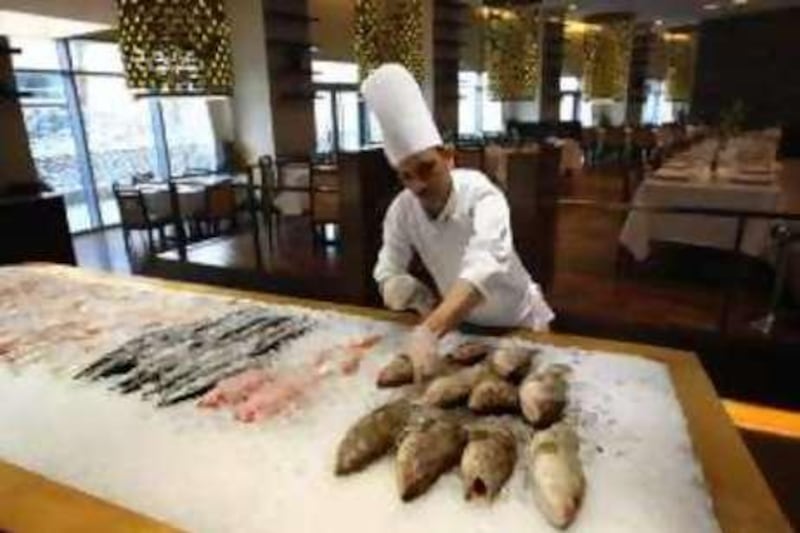Al Sultan Brahim Beirut isn't just a seafood restaurant. It's a Lebanese seafood restaurant. Depending on your point of view, this presents you with either a dilemma to grapple with or a mountain to climb. Option A is to choose between a raft of traditional Lebanese mezze plates and a fine spread of expertly grilled and fried seafood. Option B is to greedily indulge in both. The trouble with the latter course of action is that you inevitably end up with far more food than you ever imagined the table could accommodate. But with food this good, where's the problem?
The restaurant at the InterContinental Dubai Festival City is the newest branch of a famous Beirut seafood institution. The original was opened on the coast of Jnah, to the south of the Lebanese capital, in 1968. Since then, branches have spread across the city. Now the family-run restaurant has reached Dubai, at a prime waterfront location in one of the emirate's premier hotels. The only problem with this is that Al Sultan Brahim has been overshadowed somewhat by the launch of the excellent Reflets Par Pierre Gagnaire in the same establishment. But whatever Pierre Gagnaire can offer in terms of inspired creativity and French panache, Al Sultan Brahim can match with simplicity and time-honoured Lebanese tradition.
Naturally, we ordered both the mezze and the fish. Moments before the table began to fill up with plates, I'd taken a stroll down by the fish market, where a healthy and fresh haul glistened on a sea of crushed ice. There I chose a medium-sized hammour and a couple of barracuda, glinting, silver and pointed like a pair of chef's knives. While they were whisked off to be cooked, we started on a pert and verdant tabbouleh, which was vibrant with sweet tomatoes and tart lemon. It was complemented perfectly by the crumbly, herby cheese of the shanklish, especially when wrapped up in a fold of puffy, hot flatbread.
The dishes kept coming - four rakakat cheese rolls provided us with beautifully delicate filo pastry pillowcases stuffed with gooey melted feta cheese; and a plate of raheb bateja presented a fluffy quilt of mushy, smoky aubergine that was softer than a lullaby. This was Arabic comfort food at its best, but before we could curl up into the foetal position and start sucking our thumbs, we were prodded alert by the vivacious octopus Provencale. Too many times, in expensive restaurants, I've been served octopus that could conceivably be fashioned into spheres and resold as bouncy balls. This time the tentacles were exceedingly tender yet the Provencale sauce delivered a nice citrusy kick.
That's it. We were stuffed. But we were only halfway up the mountain. Soon, our first plate of fish materialised - the silver barracuda had turned a wonderfully crisp golden brown in the fryer, and the pale flaky flesh underneath the skin made for a satisfying contrast. It was proof positive that while deep-frying fish may not be particularly healthy, it sure is tasty. It was followed by the grilled hammour, which yielded a generous hunk of light and flavoursome snow-white meat. A waiter even offered to bring us more Provencale sauce for the fish, a move that exemplified the excellent service.
Those without the stomach for a challenge might have quit then and there, but we resolutely slogged on to the summit with a plate of homemade Arabic pastries that delivered as much satisfaction as planting a flag at the peak of Mount Everest. We left Al Sultan Brahim Beirut feeling on top of the world, even though we were a few pounds heavier than when we'd arrived. But like I said, where's the problem in that?






